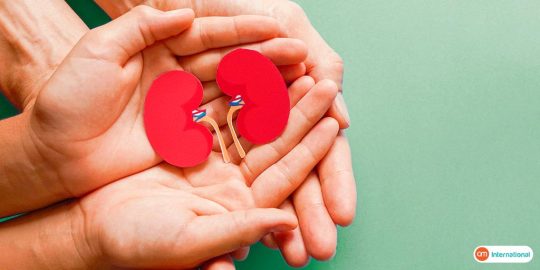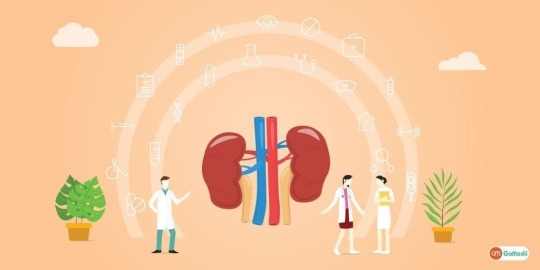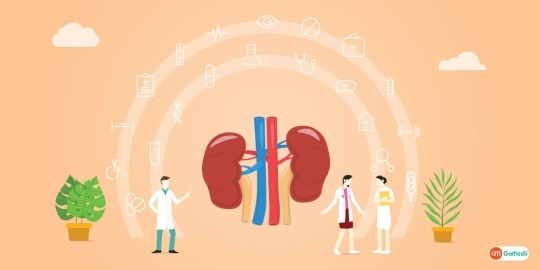#kidneytreatmentcostinindia
Text
Kidney Treatment in India

The country provides modern treatment to set most kidney diseases right, from chronic to end-stage diseases. Indian medical facilities ensure that a person suffering from chronic kidney related diseases or life-saving conditions like organ transplantation is not denied the opportunity of quality medical care. Obviously, if one's body develops diseases that require special care and intervention, then getting kidney treatment in India becomes the best option.
#kidneytreatmentinindia#kidneytreatmentcostinindia#costofkidneytreatmentinindia#kidneytreatmentinindiacost#affordablekidneytreatmentinindia#signsandsymptomsofkidneydiseases#typesofkidneytreatment#diagnosisandtestsofkidney#successrateofkidneytreatmentinindia#riskfactorsofkidney#kidneytreatmenthospitalsinindia
0 notes
Text
Kidney disease means there is damage to your kidneys; hence aren’t working properly. Many kidney conditions are “chronic” because the kidney function worsens over time. Many kidney diseases can lead to kidney failure also called end-stage kidney disease. At this point, you’ll need dialysis (artificial filtering) or a kidney transplant.
#kidneytreatmentinindia#kidneytreatmentcostinindia#costofkidneytreatmentinindia#kidneytreatmentinindiacost#affordablekidneytreatmentinindia
1 note
·
View note
Text
Kidney Treatment in India

Kidney disease in India connotes damage to the kidneys, which essentially translates to poor functioning. Such conditions are generally chronic in nature and progression is relentless, after which it culminates in the end-stage kidney disease. Such a critical stage demands different intervention possibilities in terms of dialysis or kidney transplantation to maintain life.
Read more: Best Kidney Treatment in India
#kidneytreatmentinindia#kidneytreatmentcostinindia#costofkidneytreatmentinindia#kidneytreatmentinindiacost#affordablekidneytreatmentinindia
0 notes
Text
What Are The Best Kidney Treatments In India?

Determining the best kidney treatment in India involves considering various factors, including the specific kidney condition, the patient's individual health, the expertise of healthcare providers, and the available treatment options. India is known for its world-class medical facilities and highly skilled medical professionals, making it a popular destination for kidney treatment. Let's explore some of the top kidney treatment options in India.
Kidney Transplantation:
Kidney transplantation is often considered the most effective treatment for end-stage kidney disease (ESKD). India has a thriving kidney transplant program with well-established transplant centers in cities like Chennai, Delhi, Mumbai, and Hyderabad. Renowned hospitals and transplant surgeons in India have successfully performed numerous kidney transplants, including living donor and deceased donor transplants. The success rates for kidney transplantation in India are generally high, and the procedure offers the potential for a better quality of life. Hemodialysis and Peritoneal Dialysis:
Dialysis is a life-saving treatment for individuals with advanced kidney disease. India has a vast network of dialysis centers that provide both hemodialysis and peritoneal dialysis services. These centers are equipped with state-of-the-art dialysis machines and offer high-quality care. Patients can undergo regular dialysis sessions to manage their kidney condition and maintain overall health. Laparoscopic Nephrectomy:
Laparoscopic nephrectomy is a minimally invasive surgical technique used to remove a diseased or non-functioning kidney. It involves smaller incisions, reduced post-operative pain, and quicker recovery compared to traditional open surgery. Leading hospitals in India have experienced urologists and surgeons who perform laparoscopic nephrectomy with precision. Treatment for Kidney Stones: India has skilled urologists who specialize in the diagnosis and treatment of kidney stones. Various treatments, including shockwave lithotripsy, laser lithotripsy, and minimally invasive surgeries, are available to manage kidney stones effectively. Patients with kidney stones can receive comprehensive care and guidance on dietary and lifestyle changes. Pediatric Kidney Care: India also excels in pediatric nephrology and offers advanced treatments for kidney conditions in children. Leading pediatric hospitals provide specialized care for young patients with congenital kidney disorders, kidney infections, and other kidney-related issues. Treatment for Chronic Kidney Disease (CKD): Managing CKD involves a combination of medication, lifestyle modifications, and close monitoring. Nephrologists in India work with patients to slow the progression of CKD and prevent complications. They provide guidance on diet, medication, and regular check-ups to maintain kidney function. Medical Tourism: India is a hub for medical tourism, attracting patients from around the world. The cost of kidney treatment in India is often more affordable than in many Western countries, making it an attractive option for international patients seeking high-quality care. Ultimately, the "best" kidney treatment in India depends on the specific diagnosis and individual circumstances. It is crucial for patients to consult with experienced nephrologists and urologists who can assess their condition and recommend the most appropriate treatment plan. India's healthcare infrastructure, skilled medical professionals, and range of treatment options make it a top destination for kidney care.
#kidneytransplant#kidneytreatmentdoctors#kidneytreatmentexperts#kidneytreatmenthospitals#kidneytransplantdoctors#kidneytransplantexperts#kidneytreatmentinindia#kidneytreatmentcostinindia#costofkidneytreatmentinindia#kidneytreatmentinindiacost#affordablekidneytreatmentinindia
0 notes
Text
Kidney Dialysis Treatment in India
Anyone can get chronic kidney disease. You are more at risk for chronic kidney disease if you have diabetes, high blood pressure, heart disease, family history of kidney disease, abnormal kidney structure, your age then you can get treatment. You can get the best Kidney Dialysis Treatment in India.
#kidneytreatmentinindia#kidneytreatmentcostinindia#costofkidneytreatmentinindia#kidneytreatmentinindiacost#affordablekidneytreatmentinindia
0 notes
Text
The Road to Kidney Recovery: Hydronephrosis Surgery Explained

Hydronephrosis
Hydronephrosis is a scientific condition that involves the swelling of 1 or each kidneys because of the buildup of urine. it is usually due to an obstruction or blockage that forestalls the ordinary go with the flow of urine from the kidneys to the bladder. This situation can cause soreness, ache and probably serious complications if left untreated. whilst greater conservative treatments are ineffective, surgery will become a possible alternative for coping with and resolving hydronephrosis.
(People Also Like to Read: Kidney Dialysis Treatment Cost in India)
What Is Hydronephrosis?
Hydronephrosis occurs when the urine backs up into the kidneys, causing them to become enlarged and distended. This circumstance can end result from different factors which include kidney stones tumors urinary tract infections, and congenital abnormalities. the buildup of urine can exert stress at the renal tissue and impair kidney function over time.
Exploring Surgical Intervention
When Is Surgery Necessary?
In instances of slight to slight hydronephrosis scientific management and life-style adjustments may be enough to alleviate signs and symptoms and improve the circumstance. However, when hydronephrosis is severe, persistent, or causing complications such as infection or impaired kidney function, surgical intervention may be recommended.
Types of Hydronephrosis Surgery
Numerous surgical techniques may be done to deal with hydronephrosis, relying on the underlying cause and severity of the condition. The two main surgical approaches are:
Pyeloplasty
Pyeloplasty is a surgical operation that entails doing away with the obstructed or narrowed a part of the ureter and reconstructing the renal pelvis to improve urine glide. This surgery is regularly used while hydronephrosis is due to a blockage or narrowing of the connection among the kidney and the ureter.
Stent Placement
For less severe cases of hydronephrosis, a minimally invasive procedure called stent placement may be performed. Throughout this technique, a small tube known as a stent is inserted into the ureter to maintain it open permitting urine to flow freely from the kidney to the bladder.
The Benefits Of Surgery
Restoring Kidney Function
Hydronephrosis surgery aims to relieve the stress on the kidneys and restore normal urine go with the flow. through addressing the underlying motive of the situation surgery can assist prevent similarly kidney damage and improve overall kidney feature.
Alleviating Symptoms
Severe hydronephrosis can cause pain, discomfort, and urinary symptoms. surgical operation can alleviate those symptoms considerably enhancing the affected person's first-class of existence and nicely being.
Considerations And Recovery
Preparing For Surgery
Before the present process of hydronephrosis surgical operation, patients will go through a thorough assessment, along with medical history imaging assessments, and probably a urologic evaluation. These statistics enable the scientific crew to determine the maximum suitable surgical technique for the character patient.
The Surgical Procedure
Hydronephrosis surgery is normally finished under well-known anesthesia. The specific surgical approach used will depend upon the affected person's situation and the selected approach. restoration times vary but most sufferers can assume to spend some days inside the hospital after the procedure.
Post-Operative Care
After surgical operation, patients will obtain instructions on wound care pain management and different aspects of post-operative recuperation. it is essential to comply with these instructions closely to make certain a clean recovery and the first-rate possible outcome.
Embracing Kidney Health
Long-Term Monitoring
Following hydronephrosis surgery, regular follow up appointments with the medical team are essential. These appointments allow for the monitoring of kidney function healing progress and the early detection of any potential complications.
Lifestyle Adjustments
To prevent future episodes of hydronephrosis, sufferers may additionally need to make sure lifestyle changes. Staying nicely hydrated, preserving a healthful food regimen and dealing with underlying clinical situations can all make a contribution to kidney fitness and normal properly being(hydronephrosis treatment (pyeloplasty)).
#kidneydialysistreatmentinindia#kidneydialysistreatmentcostinindia#costofkidneydialysisinindia#kidneytransplantcostinindia#kidneytreatmentcostinindia
0 notes
Text
Early Warning Signs of Kidney Disease

The need for kidney transplant treatment in India has seen an increase in recent years. Although there are many advanced drugs available, many factors contribute to the health hazard. In this article, we'll cover the signs that should alert you to kidney disease. Experts from Kidney Transplant Hospitals in India share the following signs that one can potentially look out for –
(People Also Like to Read: Kidney Dialysis Treatment in India)
Feeling Constantly Tired
Your kidneys remove waste from your blood and pass it out through urine. Toxins can build up when your kidneys aren't working properly. Weakness is a common warning sign. You may feel tired, weak or have trouble concentrating. A hormone produced by the kidney tells the body to produce red blood cells. If the amount of oxygen in your muscles and brain is low, your blood cannot supply them with the required amount of oxygen.
Bad Sleep
Studies point to a link between sleep apnea and chronic kidney disease (CKD), which damages your organs over time and can lead to kidney failure. Sleep apnea can affect your kidneys because it reduces the amount of oxygen your body receives.
Itchy Skin
This can happen when toxins build up in your blood because your kidneys are unable to eliminate them. This can lead to a rash or intense itching. Over time, your kidneys may become less efficient at balancing minerals and nutrients in your body. Mineral and bone disorders can lead to dry, itchy skin.
Swollen Face and Legs
Fluids build up in your body as your kidneys struggle to properly eliminate salt. This can lead to swelling in the hands, feet, ankles, legs, or even the face. Your feet and ankles in particular may show signs of swelling. Also, the area around your eyes may look swollen if protein leaks into your urine.
Muscle Cramps
If the levels of sodium, calcium, potassium, or other electrolytes are out of balance, certain health problems can arise in the muscles and nerves. It must be checked in time so that the situation does not progress beyond repair.
Shortness of Breath
Anyone with kidney disease will not be able to produce sufficient amounts of erythropoietin (a type of hormone). Your body's hormones are telling it to start producing red blood cells. Without it, you run the risk of developing anemia and becoming short of breath. Fluid buildup is another factor. You may have trouble breathing. In extreme cases, lying down can make you feel like you're drowning.
Misty Head
When your kidneys are unable to completely remove waste from your body, toxins can damage your brain. The oxygen your brain needs may be disrupted due to anemia. You may feel dizzy and have memory and attention problems. Even basic things can be difficult for you if you get too confused.
Poor Appetite
Your stomach may feel crampy or queasy due to kidney disease. As a result, you won't crave food so much. This can sometimes lead to weight loss.
Bad Breath
Uremia, a disorder that develops when your kidneys are unable to filter waste. This can cause a foul odor from your mouth. Also, food may taste metallic or strange if you have toxins in your bloodstream.
Foamy, Brown, or Bloody Urine
An overproduction of the protein albumin can result in bubbly urine. This can be the result of kidney problems. Similarly, very clear or brown urine may also occur. Faulty kidney function can also cause blood to enter your bladder. Kidney stones, tumors or infections are some of the conditions that can lead to blood in the urine.
#kidneydialysistreatmentinindia#kidneydialysistreatmentcostinindia#costofkidneydialysisinindia#kidneytransplantcostinindia#kidneytreatmentcostinindia
0 notes
Text
Kidney Dialysis Treatment Cost in India

Kidney Dialysis Treatment Cost in India may vary depending on various factors like type of dialysis, hospital or clinic, city and specific requirements of the patient. Generally, there are two main types of dialysis: hemodialysis and peritoneal dialysis.
#kidneytransplantinindia#kidneytreatmentcostinindia#costofkidneytreatment#kidneytransplantcost#bestkidneytreatment
0 notes
Text
Kidney Treatment Cost in India

Kidney disease means there is damage to your kidneys; hence aren’t working properly. Many kidney conditions are “chronic” because the kidney function worsens over time.
Read More: Kidney Treatment Cost in India
#kidneytreatmentcostinindia#kidneytreatmentdoctors#kidneytreatmentexperts#kidneytransplantininida#kidneytransplanthospitals
0 notes
Text
Kidney Treatment in India

Kidney Treatment in India. Kidney disease means there is damage to your kidneys; hence aren’t working properly. Many kidney conditions are “chronic” because the kidney function worsens over time.
#kidneytransplantinindia#kidneytreatmentcostinindia#costofkidneytreatment#kidneytransplantcost#bestkidneytreatment
0 notes
Text
Kidney Treatment Cost in India

Kidney Treatment Cost in India helps you to get the best treatment in India. We are providing many more treatment services kind as kidney transplants, Kidney surgery, and many more. Moreover, we are having the top best expert doctors with a minimum of 10 years of experience. We are available round the clock with very soft prices and we are also reliable to provide our service on time.
#kidneytransplantinindia#kidneytreatmentcostinindia#costofkidneytreatment#kidnerytransplantcost#bestkidneytreatment
0 notes
Text
Prevention of Kidney Failure and Diseases

Cases of kidney damage are being diagnosed with high frequency. There can be many reasons for kidney failure, which can be due to unhealthy habits or lifestyle. In this blog, I will talk about some such habits and their effects on the kidneys.
(People Also Like to Read: Kidney Treatment: Nurturing Your Kidneys for Optimal Health)
You will also find out how you can keep the organ healthy, through a conscious effort to adhere to avoid behavioral patterns that negatively affect the kidney's functionality.
The kidneys are like two bean-shaped organs that extract waste and toxins from the bloodstream and balance the fluids within the body. It also forms urine and performs other essential functions like regulation of blood pressure through the salt and water balance, and aid in red blood cell production in the body.
The kidneys are located on each side of the spine in the back muscles below the rib cage.
There are common symptoms that indicate a problem with the kidney organ like a change in color and quantity of your urine, dizziness, fatigue, breathing challenges, and sudden pain in the body.
The Following Are Common Habits That Could Damage The Kidney:
1. Insufficient intake of water: A body of water has many functions and there is no substitute for it. Consuming carbonated or energy drinks cannot meet the requirement of water as dehydration usually leads to kidney damage. Kidneys remove metabolic waste from the body and regulate erythrocyte production.
However, if the blood thickens due to a lack of sufficient water, it impairs the kidney's ability to eliminate toxins in the body. Therefore, the kidneys need to be properly hydrated in order to perform their functions properly.
2. High Salt consumption: Although intake of salt is essential to the body, too much consumption of salt can cause damage to your kidney. It's important to curtail the amount of salt you add while cooking as it could seriously threaten your health and kidney. The kidney metabolizes 95% of the sodium taken through food consumed, and the kidney works harder to extract the excess salt if it's high.
This could reduce the functioning of the kidney as it becomes strained due to the work pressure exerted on it and the result is retention of water in the body. A consequence of water retention is an increase in blood pressure and the risk of kidney disease or failure. You should be mindful of how much salt you consume and your choice of diet.
3. Filled-up bladder: It's important to empty the bladder no matter the number of times you have to use the restroom for that purpose. The urge to urinate is a signal from the body to get rid of toxic waste, and when you delay this pressure urge, it could result in kidney failure. Urine contains bacteria and when it stays in the bladder more than necessary these bacteria could multiply which could cause a kidney infection or a urinary tract infection.
4. Excessive drinking of Alcohol: Excessive drinking can cause serious kidney damage. If you must drink, do so in moderation. My doctor friend advises complete abstinence from drinking alcohol. However, you can occasionally drink red wine as it has been shown to be beneficial for heart health. Excessive consumption of alcoholic beverages causes uric acid to accumulate in the tubules of the kidneys, causing tubular obstruction.
5. Cigarette smoking: Lots of research by medical practitioners contends that smoking is bad for all organs of the body, including the kidneys. Different health challenges are associated with smoking of cigarettes and kidney disease is not an exception. Smoking reduces the blood flow in the body as it constricts the blood vessels in the kidneys.
6. High Protein diet: Enormous intake of food containing protein like red meat, and other forms of animal protein can increase the risk of developing kidney disease.
7. Use of Analgesics: If you are fond of taking pain relievers, especially without a medical prescription then it's time to stop. Consuming any form of analgesics to reduce pain, inflammation, or feverish condition should be done with the prescription of a physician. Research shows that long-term use of analgesics without a prescription may reduce the flow of blood to the kidneys and result in kidney failure.
8. Ignoring infections: You could have damage to your kidneys due to common infections like cold, cough, the flu, and tonsillitis amongst others. These common diseases have bacteria or viruses that can damage your kidneys if not treated in time. It goes without saying that you should treat common infections appropriately and immediately to avoid any further breakdown of your health.
9. Lack of sleep: The benefits of sleep to health should not be overlooked. You need an average of 7 hours of sleep every day to stay fit and healthy. Organ tissues go through a renewal process while you sleep, so the lack of sleep disrupts this normal process which could result in damage to the kidney and other vital organs. Sleeplessness may also cause high blood pressure so it's better to adopt a healthy sleeping lifestyle that would enhance your health.
(People Also Like to Read: Renal Cyst Treatment: Options and Considerations)
10. Lack of exercise: Exercise is an excellent means of staying healthy, and it improves your level of fitness and well-being. Studies reveal that people who exercise regularly have lower risks of developing kidney diseases in comparison to others who have engaged in little or no form of exercise.
#kidneytreatmentdoctors#kidneytreatmentexperts#kidneytransplantininida#kidneytransplanthospitals#kidneytreatmentcostinindia
0 notes